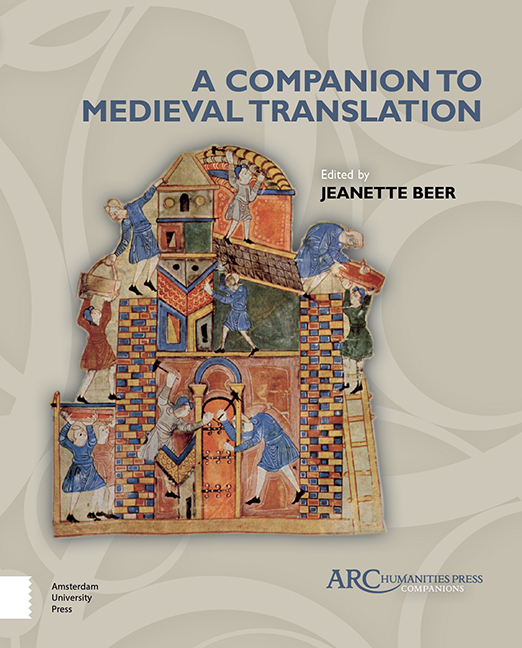Book contents
- Frontmatter
- Contents
- Acknowledgements
- Introduction
- Chapter 1 The European Psalms in Translation
- Chapter 2 The Old French Bible
- Chapter 3 Middle English Religious Translation
- Chapter 4 Bible Translation and Controversy in Late Medieval England
- Chapter 5 Medieval Convent Drama: Translating Scripture and Transforming the Liturgy
- Chapter 6 Translating Romance in Medieval Norway: Marie de France and Strengleikar
- Chapter 7 Christine de Pizan, Translator and Translation Critic
- Chapter 8 Translation, Authority, and the Valorization of the Vernacular
- Chapter 9 Vernacular Translation in Medieval Italy: volgarizzamento
- Chapter 10 Dante and Translation
- Chapter 11 Chaucer and Translation
- Chapter 12 Alchemy and Translation
- Chapter 13 Scientific Translation: A Modern Editor’s Perspectiv
- Chapter 14 Modern Theoretical Approaches to Medieval Translation
- Chapter 15 Observations on Translation by a Thirteenth-Century Maître: Li Fet des Romains
- Epilogue. Observations on Translation by the Oxford Professor of Poetry: Pearl
- General Bibliography
- Appendix
- Index
Chapter 1 - The European Psalms in Translation
Published online by Cambridge University Press: 20 November 2020
- Frontmatter
- Contents
- Acknowledgements
- Introduction
- Chapter 1 The European Psalms in Translation
- Chapter 2 The Old French Bible
- Chapter 3 Middle English Religious Translation
- Chapter 4 Bible Translation and Controversy in Late Medieval England
- Chapter 5 Medieval Convent Drama: Translating Scripture and Transforming the Liturgy
- Chapter 6 Translating Romance in Medieval Norway: Marie de France and Strengleikar
- Chapter 7 Christine de Pizan, Translator and Translation Critic
- Chapter 8 Translation, Authority, and the Valorization of the Vernacular
- Chapter 9 Vernacular Translation in Medieval Italy: volgarizzamento
- Chapter 10 Dante and Translation
- Chapter 11 Chaucer and Translation
- Chapter 12 Alchemy and Translation
- Chapter 13 Scientific Translation: A Modern Editor’s Perspectiv
- Chapter 14 Modern Theoretical Approaches to Medieval Translation
- Chapter 15 Observations on Translation by a Thirteenth-Century Maître: Li Fet des Romains
- Epilogue. Observations on Translation by the Oxford Professor of Poetry: Pearl
- General Bibliography
- Appendix
- Index
Summary
In the exceedingly useful preface to his Expositio psalmorum, Cassiodorus follows Jerome in pointing out
licet psalterium quartus codex sit auctoritatis diuinae, primum tamen tirones incohantes scripturas sanctas, inde legendi faciunt decenter initium.
(though the psalter is the fourth book authorised by God, it is fittingly the first with which novices begin when embarking on the holy Scriptures.)
The sixth-century thinker discusses other important elements of the Psalms for the study and understanding of Christian doctrine, for deeper and more engaged devotion to God, for a true understanding of penitence, for beauty and sweetness when sung, for comprehension of the prophecy and wisdom of the Old Testament and especially of David, and for the instruction of the faithful as to the role of Jesus Christ. His study, Cassiodorus states humbly, is based entirely on the abundant and satisfying commentary of Augustine, with some new interpretations and a more concise approach. Thus this second major Christian commentary on the psalter emphasizes the role of the Psalms in teaching, emphasizes the many purposes of the Psalms in devotion and Christian engagement, and greatly emphasizes the way in which this approach is only slightly altered from earlier approaches, and really only does the same work, with very minor differences. Cassiodorus's focus is on the continuity and the centrality of the Psalms in Christian devotion and thinking. The psalter is a fixed certainty, but one that each Christian must engage with individually and personally. Slightly earlier in the preface, Cassiodorus quotes Athanasius as suggesting that the Psalms are, peculiarly, the words of the individual speaking from her or his own heart:
Quicumque psalmi uerba recitat, quasi propria uerba decantat et tamquam a semetipso conscripta unus psallit et non tamquam alio dicente, aut de alio significante sumit et legit.
(Whoever recites the words of a psalm seems to be repeating his own words, to be singing in solitude words composed by himself; it does not seem to be another speaking or explaining what he takes up and reads.)
The psalter is a deeply personal book of the Bible, one that each individual Christian uses to offer words to God. In so doing, they reflect the words of Christ on the cross, who according to the evangelists (Matt. 27:46, Mark 14:62, Luke 22:69, John 19:24) used psalm verses to speak to or of God during his passio.
- Type
- Chapter
- Information
- Companion to Medieval Translation , pp. 13 - 22Publisher: Amsterdam University PressPrint publication year: 2019

